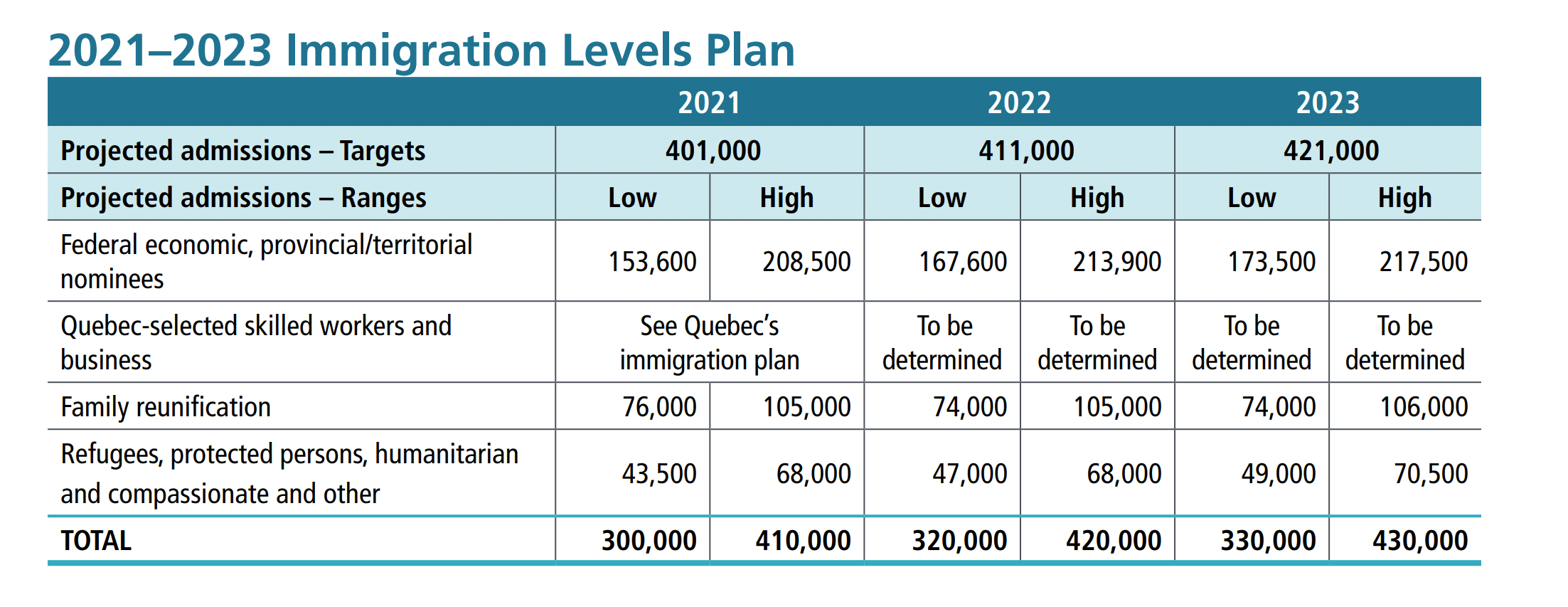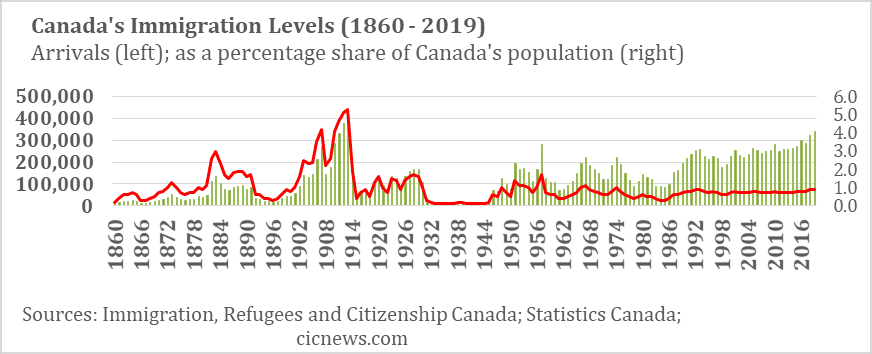Canada to target over 400,000 immigrants per year
Today, Canada announced its 2021-2023 Immigration Levels Plan. Canada will target the highest level of immigration in its history.
Over the coming three years, Canada will aim to welcome the following level of new permanent residents:
- 2021: 401,000 immigrants
- 2022: 411,000 immigrants
- 2023: 421,000 immigrants
The only time Canada welcomed over 400,000 immigrants in a year was in 1913, when it admitted 401,000 newcomers. It has never come close to this figure again.
The 2021-2023 Immigration Levels Plan aims to welcome about 60 per cent of all immigrants under economic class programs, including through Express Entry and the Provincial Nominee Program.
The Immigration Levels Plan is the most important immigration announcement made by the Government of Canada each year. It outlines the number of new permanent residents Canada aims to welcome over the coming years, and what categories Canada aims to admit them under. Canada welcomes immigrants under the following categories: economic; family; refugee; and humanitarian and compassionate grounds.
Get a free Canadian immigration assessment

Earlier this year, on March 12, the federal government announced Canada would aim to welcome over one million new permanent residents between 2020 and 2022. Days later, Canada had to shut its borders due to the COVID-19 pandemic.
As a result, Canada will likely fall well short of the 341,000 immigration target it set for this year, however it has been holding Express Entry draws throughout the pandemic that will result in Canada breaking its Express Entry record this year. In addition, Provincial Nominee Program (PNP) draws remain ongoing.
To compensate for the fall of immigration this year, Canada has set the most ambitious immigration levels plan in its history.
Click here to view Canada's Immigration Levels Plan 2021-2023
Why Canada is maintaining high immigration
Canada is maintaining high levels of immigration to offset the negative economic and fiscal impacts of its aging population and low birth rate.
Canada has one of the world's oldest populations, with nearly 18 per cent of its population being age 65 and over. It also has one of the world's lowest birth rates at 1.47 births per woman. As such, Canada will face challenges growing its economy and supporting government spending in the future. These challenges can be be alleviated by welcoming more immigrants to support labour force and economic growth.
Since its founding in 1867, Canada has welcomed at least 300,000 immigrants in a year just five times. It is currently welcoming 0.9 per cent of its population in immigrants, which is three times higher than the per capita newcomer intake in the United States.
At the same time, Canada has had a higher per capita intake in the past, welcoming 1 per cent or more of its population in newcomers, something it regularly achieved in the decades prior to the First World War.
Canada's immigration record was achieved in 1913 when it welcomed 401,000 immigrants which was over 5 per cent of its population in newcomers. Today, a 5 per cent newcomer intake would result in 2 million new immigrants arriving to Canada.

Get a free Canadian immigration assessment
Canadian immigration during COVID-19
While admission targets are growing, Canada is experiencing a drop in the the number of new permanents landing in the country in 2020. There were 64 per cent fewer new permanent residents admitted in August, compared to August 2019. This is partially due to the number of people who were approved for permanent residence, but were unable to travel to Canada before their immigration documents expired due to coronavirus-related travel restrictions and other disruptions.
Public support for immigration in Canada has increased over the course of the pandemic, according to an Environics Institute study. By a five-to-one margin, Canadians report that immigration makes Canada a better country, and they are more likely to say this is because it makes for a more diverse and multicultural place to live. Another survey by the Association of Canadian Studies found that Canadians generally see immigration as positive for long-term economic recovery, but they want to see family members given priority for immigration.
Get a free Canadian immigration assessment
© 2020 CIC News All Rights Reserved
- Do you need Canadian immigration assistance? Contact the Contact Cohen Immigration Law firm by completing our form
- Send us your feedback or your non-legal assistance questions by emailing us at media@canadavisa.com







